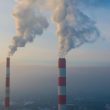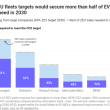Apple has been barred from marketing its Apple Watch as a “CO₂-neutral product” in Germany after a Frankfurt court ruled the claim misled consumers. The case was brought by environmental campaigners who argued the company’s advertising violated German competition law.
Judges found that Apple’s assertion of carbon neutrality, promoted online as “our first CO₂-neutral product,” was unfounded. The court said Apple relied on a forestry project in Paraguay to offset emissions, but noted that leases covering 75% of the plantation area were only guaranteed until 2029, casting doubt on the project’s long-term viability.
“The supposed storage of CO₂ in commercial eucalyptus plantations is limited to just a few years, the contractual guarantees for the future are not sufficient and the ecological integrity of monoculture areas is not guaranteed,” said Juergen Resch, head of Deutsche Umwelthilfe (DUH), the group behind the legal challenge. He hailed the judgment as a victory against “greenwashing.”
Apple defended its approach, saying the decision “broadly upheld our rigorous approach to carbon neutrality.” However, the company declined to confirm whether it would appeal. It had previously warned that such legal actions risk discouraging “credible corporate climate action.”
The ruling comes as the European Union prepares to introduce legislation in 2026 restricting the use of terms such as “carbon neutral” unless they are backed by robust scientific evidence. Reports suggest Apple will drop the label from future Apple Watch marketing to comply with the new rules.
The use of monoculture eucalyptus plantations for carbon offsets has been heavily criticised by ecologists, who argue they threaten biodiversity and demand intensive water resources, earning them the label of “green deserts.” Similar forestry-based carbon offset projects in Latin America have also attracted investment from tech companies including Meta and Microsoft.













